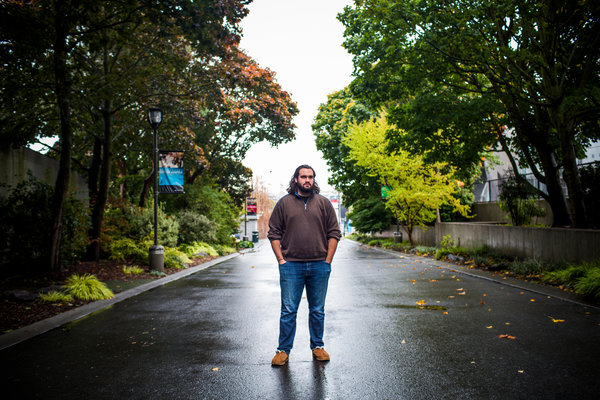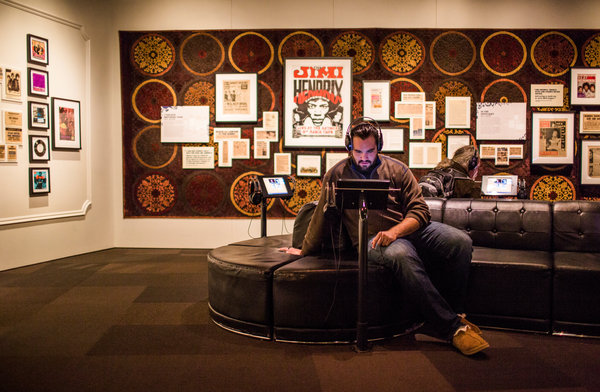- Thread starter
- #1
Rock Strongo
My mind spits with an enormous kickback.
http://www.nytimes.com/2014/11/06/s...ky-transition-to-life-after-the-nfl.html?_r=1
A Year of Unforeseen Hits
John Moffitt Rides Rocky Transition to Life After the N.F.L.
By KEN BELSONNOV. 5, 2014
Photo

John Moffitt, a former offensive lineman, abruptly retired from the Denver Broncos a year ago. CreditMichael Hanson for The New York Times
SEATTLE — John Moffitt spent 20 years to reach the pinnacle of his profession, a day to ditch that job and a year grappling with the consequences of his decision.
A Year of Unforeseen Hits
John Moffitt Rides Rocky Transition to Life After the N.F.L.
By KEN BELSONNOV. 5, 2014
Photo

John Moffitt, a former offensive lineman, abruptly retired from the Denver Broncos a year ago. CreditMichael Hanson for The New York Times
SEATTLE — John Moffitt spent 20 years to reach the pinnacle of his profession, a day to ditch that job and a year grappling with the consequences of his decision.
- A year ago this week, Moffitt, a little-known offensive lineman for the Denver Broncos,made national news when he abruptly retired, giving up about $1 million in pay, a potential trip to the Super Bowl and a high-profile lifestyle envied by millions of Americans.
Battered by injuries, tired of the grinding routines and sapped of the passion that had driven him since he began playing as an 8-year-old, Moffitt walked away from the N.F.L. with no plan other than to explore life beyond football.
Moffitt’s leap was praised by the league’s detractors, who applauded his willingness to lift the veil on a brutal sport that puts players in harm’s way for profit and to push back against society’s expectations for professional athletes. To the N.F.L.'s many backers, Moffitt was a naïve idealist who did not know his own luck and would lament his decision.
Photo

Moffitt said he struggled to replace the structure that defined his football life, partying too much and getting arrested on battery and drug possession charges.CreditMichael Hanson for The New York Times
Moffitt, who lives in Seattle, said he had no regrets. Yet his journey into retirement at 27 has been a cautionary tale of how unprepared some professional athletes — even those with money, a four-year college degree and a supportive family — are for life outside the sports bubble.
“Leaving the N.F.L. on your choice is a transition I hadn’t even realized,” Moffitt said last week, a day before his 28th birthday. “I thought if I made the choice, it would be easy. I’m dealing with the fallout.”
That fallout started immediately. Moffitt’s life was abuzz for weeks after he told the Broncos’ president, John Elway, that he was done playing. Besieged with interview requests, he told reporters that playing in the N.F.L. made him feel like a commodity and that the risk of further damage was no longer worth the money or adulation.
Yet after the attention faded, Moffitt struggled to replace the structure that defined his football life, with its predictable rhythms and ready-made circle of friends. He produced podcasts, did some public speaking and worked with a writer to shape his thoughts into a book. He went for a screen test and developed a stand-up comedy routineabout life as a player that he has performed live.
And he partied. Unshackled from the weekly schedules built around Sunday games, he was free to smoke marijuana, binge drink with college buddies and experiment with harder drugs. His relationship with his girlfriend soured, so he took to the road, staying with his parents in Connecticut and meeting up with friends in Los Angeles, Miami, New York and beyond.
Just before St. Patrick’s Day, he hit bottom. After a day of drinking with friends in Chicago, he ended up alone in a basement club. A bouncer spotted him with a sunglasses case that was filled with a gram of cocaine, 10 grams of marijuana and four ecstasy pills. A scuffle ensued, and he was arrested and charged with battery and three counts of drug possession. He was released on his own recognizance a half-day later.
Continue reading the main story
The night in jail woke him up. Not only did he face more time in jail, but the story of his arrest was splashed on the Internet. His relationship with his girlfriend dissolved and book publishers withdrew interest in his story.
“It was like I jumped off a cliff,” Moffitt said of his arrest and the negative publicity that followed. “Those opportunities fell by the wayside. But it also sent me in a different direction.”
Before the drug charges were dismissed and he pleaded guilty to the other charge (he was fined $254), Moffitt enrolled in Passages, a high-end rehabilitation clinic in Malibu, Calif. There, he weaned himself off drugs and alcohol and let go of the pressure he felt to meet the expectations that others had for him, though fellow residents at the clinic quizzed him unendingly about his life in the N.F.L.
Photo

Moffitt at the EMP museum in Seattle. He has considered driving an Uber cab and has experimented with standup comedy. CreditMichael Hanson for The New York Times
“The biggest thing was that I realized so many people were depending on me, and I felt that my only value is my production as a football player,” he said. “Whether it was expectations or money or the way I live, if I don’t meet everyone’s expectations, I’m a loser. It is out of love, but I felt like I was holding up this huge support system that was supposed to be my support system.”
Moffitt’s roller-coaster ride is not uncommon, said Bahati VanPelt, the executive director of the Trust, a group funded by the N.F.L. and players union that helps players after they retire. Players spend much of their childhood and their adult lives fixated on football and devote little time to developing skills that will help them afterward.
Three-quarters of players drafted in the N.F.L. are gone within four years, either through injury or because they were cut, and they may feel they have failed or are too proud to ask others for help. Some players live away from those who could provide medical and psychological support, and some may not have saved much money.
“Ever since they were in high school, players are told not to worry about the next play, only this play,” said VanPelt, who added that making the transition to life outside the N.F.L. could take from three months to two years. “They were an expert in their field, and suddenly they’re expected to be an expert in other fields.”
Moffitt is still unsure of how he will make a living, though he is interested in the film industry. He has considered driving an Uber cab and doing more standup comedy. In a few months, he said he would leave Seattle and his circle of football friends to start fresh in a new city. He is spending time with Sean Pamphilon, who has made documentaries about football players and witnessed their ups and downs.
“There’s a duality to John that I’m sure you understand: He’s incredibly funny, or he really wants to go inside himself and disappear,” Pamphilon said. “I’m excited to see how he can use his brain while not getting it beaten in.”
By some standards, Moffitt — who joked that he had outlived Jimi Hendrix, Janis Joplin and Jim Morrison, three of his musical heroes, who all died at 27 — is more fortunate than many players. He is single and has no children, and he worked with a financial adviser to put away money while he played. He moved into a smaller townhouse in Renton, not far from where the Seahawks, who drafted him in 2011, have their practice facility.
He is also close with his parents, who loved that their son had made it to the N.F.L. and were taken aback when he walked away from the game. After Moffitt was arrested, his father did not give him any ultimatums but made it clear that it was up to him to change his behavior.
“I said, “I love you and will visit you in jail, but I don’t want to have to visit you in jail,' ” David Moffitt said. “I told him, ‘You’re at a crossroad; there is no in between.’ ”
Moffitt’s father said his son was “no angel,” and he said he recognized that John had partied too much but said, “You put it under the rug.” Ultimately, he said he was happy that John was at peace with his decision.
“He’s much more relaxed and not jacked up all the time,” the elder Moffitt said. “He doesn’t have any regrets, and I don’t either.”






















